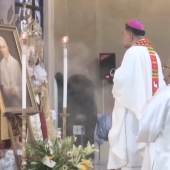Philippine banks pulled brakes on coal, gas financing in 2024; Bishop says “glimpse of hope”
For the first time since the Paris Agreement, no new financing was recorded for domestic Philippine banks throughout 2024, a positive development that advocates say is telling of the increasing viability of renewable energy in the country, says the think tank Center for Energy, Ecology, and Development (CEED), in a statement on April 23.
CEED annually publishes The Fossil Fuel Divestment Scorecard to assist Philippine banks and their stakeholders in evaluating how they and their peers are faring in assisting the Philippines’ energy transition.
CEED is a convenor of Withdraw from Coal: End Fossil Fuels (WFC: EFF), a watchdog network on fossil fuel and renewable energy financing launched in 2019.
Bishop Gerry Alminaza, lead convenor of WFC: EFF, said this year’s scorecard offers a glimpse of hope. “This year began with a stark warning of how gravely insufficient climate action has been in the last decade, especially on action necessary to end global dependence on fossil fuels: 2024 is the first full calendar year recorded of temperature rise beyond 1.5°C. IIf nothing changes, it could signal the beginning of the feared long-term breach and even more severe and widespread climate impacts than previously expected.
The report said, “This lack of deals likely reflects the banks’ aversion to the increasing risks of the fossil fuel industry. Delays in approving power supply agreements, uncertainties, and shifting pronouncements from generation companies on the fuel to be used for plants, fluctuating prices of coal and gas in the global market, as well as the palpable pressure from communities affected by the pollution from the industry and aggravating climate crisis, all contribute to the riskiness of the industry.
Since the enactment of the Renewable Energy Law in 2009, the size of renewable energy financing has doubled, according to the statement.
“We should approach this pivotal moment cautiously. The historical dominance of fossil fuel financing remains prevalent, driven by laws like the country’s Natural Gas Industry Development Act, passed in January 2025, that pose significant risks" Current and new bank divestment policies contain loopholes that allow for renewed investments in harmful and destructive energy sources, according to CEED Executive Director Gerry Arances.
CEED and WFC: EFF is alarmed that a new deal was entered by some of the country’s biggest banks to back fossil gas expansion just at the start of the year.
“I hope that this state of affairs signifies that our domestic banks are increasingly embracing their crucial role in combating the worsening climate chaos. Unfortunately, we recently saw news break out of three major commercial banks—BPI, BDO, and Metrobank—starting in 2025, wrongly financing the joint venture of San Miguel Corporation, Aboitiz Power, and Meralco’s MGen for three gas facilities along the biodiverse Verde Island Passage. It is clear that much is left to be done for Philippine banks to truly end their contributions to harming our climate, people, and environment with fossil fuel financing,” said Bishop Alminaza.
“The path forward is clear: our financial institutions must stop all new fossil fuel financing and accelerate their commitment to renewable energy for a clean, just, and people-centered development future for all Filipinos,” Arances said.
Radio Veritas Asia (RVA), a media platform of the Catholic Church, aims to share Christ. RVA started in 1969 as a continental Catholic radio station to serve Asian countries in their respective local language, thus earning the tag “the Voice of Asian Christianity.” Responding to the emerging context, RVA embraced media platforms to connect with the global Asian audience via its 21 language websites and various social media platforms.















